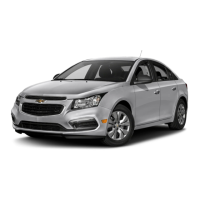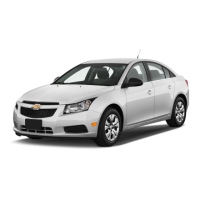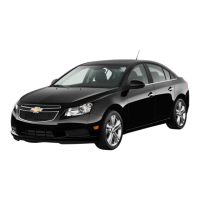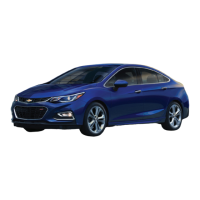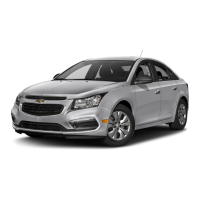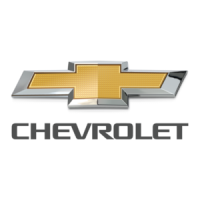Do you have a question about the Chevrolet cruze 2017 and is the answer not in the manual?
Information on obtaining a French language manual from your dealer or Helm, Inc.
Guide to quickly locate information using the Index, an alphabetical list of topics.
Explains hazard messages on labels and in the manual to avoid or reduce risks.
Explains vehicle components and labels that use symbols instead of text.
Lists additional symbols found on the vehicle and what they mean.
Diagram and labels for the instrument panel components.
Overview of important features that may or may not be on your specific vehicle.
Explains the fuel-saving stop/start system for engine conservation.
Information on the remote keyless entry transmitter and its operating range.
How to start the engine remotely.
How to lock/unlock doors from inside and outside the vehicle.
Warning about exhaust gases and instructions on how to open the trunk.
How to open and close power windows.
Manual front seat adjustment instructions.
How to adjust power driver seat features.
Operation of the heated seats feature.
Instructions for adjusting head restraints for comfort and safety.
Information on proper safety belt usage and related sections.
Explanation of the passenger sensing system and its indicators.
Instructions for adjusting exterior and interior mirrors.
How to adjust the steering wheel for comfort and control.
Information on dome lamps and reading lamps.
Details on exterior lamp controls and functions.
Operation of the windshield wipers and washer fluid.
Controls for heating, cooling, and ventilation systems.
Information on manual mode and up-shift light.
Overview of infotainment system and radio functions.
Audio controls and interaction with OnStar/Bluetooth.
Operation of cruise control system settings.
Explanation of DIC display and Uplevel DIC Controls.
How FCA helps avoid or reduce harm from front-end crashes.
How LKA helps avoid crashes due to unintentional lane departures.
LCA as a lane-changing aid to avoid lane change crashes.
RCTA warns of traffic crossing the vehicle's path.
RPA sensors detect objects behind vehicle.
Use of 12-volt accessory power outlets.
Operation of the sunroof feature.
How TCS and StabiliTrak assist with vehicle control.
Information on the Tire Pressure Monitor System (TPMS).
Guidance on using unleaded gasoline.
Requirements for diesel fuel with ultra low sulfur content.
How the engine oil life system calculates and displays engine oil life.
Information on the Diesel Particulate Filter (DPF) and its cleaning.
Information on Diesel Exhaust Fluid (DEF) and its function.
Information on enrollment and contact details.
Overview of keys and lock systems.
Information on the RKE system and operating range.
How to start the engine remotely.
Dangerous unlocked doors and how to lock them.
Theft-deterrent features and alarm system.
Information on convex, power, folding, and heated mirrors.
Adjusting rearview mirrors for clear viewing.
Warning about leaving children and power window operation.
Information on sunroof operation and sunshade.
Adjustable head restraints in front and rear seats.
Manual seat adjustment and seat height adjuster.
How to adjust power driver seats.
How to recline and return manual and power seatbacks.
Operation of heated front seats and remote start feature.
Information on folding rear seatbacks.
How to use safety belts properly and things not to do.
Vehicle's airbag system components.
Information on child restraints and proper usage.
How to properly secure a child restraint.
How to properly secure a child in a restraint.
Importance of rear seating positions for child restraints.
How the LATCH system secures child restraints.
General information on storage compartments.
How to open the glove box and its features.
Location and access to cupholders.
Storage area under the center console armrest.
List of vehicle controls and their corresponding page numbers.
Audio controls on the steering wheel.
Operation of the windshield wiper and washer lever.
Compass display in DIC, GPS, and StabiliTrak info.
Setting the time, date, and clock display.
Use of 12-volt accessory power outlets.
Operation of the wireless charging pocket.
Signals about vehicle condition and potential issues.
Overview of the instrument cluster gauges and indicators.
Interactive display in instrument cluster, controls and applications.
Messages on DIC indicating vehicle status or actions needed.
Exterior lamp controls and features.
How to change headlamps from low to high beam.
Feature that turns on headlamps automatically.
How to signal a turn or lane change.
Operation of front fog lamps.
System that turns high-beam headlamps on/off based on traffic.
Instrument panel illumination control and courtesy/dome/reading lamps.
Entry lighting and exit lighting features.
Battery saver feature to protect battery.
Overview of infotainment system, theft-deterrent feature, and operation.
AM-FM radio, satellite radio, and antenna information.
Avoiding untrusted media devices and USB port usage.
Bluetooth overview, pairing, and controls.
Using Apple CarPlay and Android Auto capabilities.
General information and controls for hands-free phone system.
Controls for heating, cooling, defrosting, and ventilation.
Adjustable air vents and operation tips.
Information on passenger compartment air filter and service.
Information on safe driving practices.
Avoiding distractions while driving.
Expecting the unexpected and wearing safety belts.
Dangers of drinking and driving.
Factors in controlling a vehicle while driving.
Factors affecting braking action, perception, and reaction time.
Electric power steering and steering in emergencies.
Types of skids and how to avoid them.
Traction and stopping ability on wet roads.
Driving on steep hills and mountains.
Driving on snow or ice and for slippery roads.
How to free the vehicle when stuck.
Importance of knowing vehicle weight capacity.
New vehicle break-in and ignition positions.
How to shift into Park and safety precautions.
Warning about carbon monoxide in exhaust.
Information on the Diesel Particulate Filter (DPF) and its cleaning.
Information on Diesel Exhaust Fluid (DEF) and its function.
Selected gear shown in instrument cluster.
Shift pattern and caution notes.
Antilock Brake System (ABS) and brake assist.
Lever and pedal apply methods for parking brake.
Feature to assist driver in emergency braking.
Traction Control/Electronic Stability Control systems.
Maintaining speed without accelerator.
Features to help avoid crashes or reduce damage.
How FCA helps avoid or reduce harm from front-end crashes.
Red FCA display and beeps for approaching vehicle too rapidly.
Amber indicator when following too closely.
SBZA as lane-changing aid for blind zones.
LCA as lane-changing aid for blind zones.
LDW helps avoid crashes due to unintentional lane departures.
LKA helps avoid crashes due to unintentional lane departures.
GM recommendations for TOP TIER Detergent Gasoline.
Importance of selecting high quality fuel for diesel engines.
Requirements for diesel fuel with ultra low sulfur content.
Biodiesel as a renewable fuel.
Tips for cold weather starting of diesel engines.
Causes and actions for water in diesel fuel.
Actions to take after running out of diesel fuel.
How to replace the diesel fuel filter.
Warnings and instructions for filling the fuel tank.
Warnings about adding electrical equipment.
Service and parts needs, dealer information.
Warning about chemicals in vehicles and parts.
Effects of non-dealer accessories on vehicle performance and warranty.
Dangers of DIY service without proper knowledge or tools.
How to open and close the hood.
Diagram of the engine compartment.
Location and inspection/replacement of the air cleaner/filter.
How the cooling system maintains engine temperature.
What to use for the cooling system and warnings.
Engine coolant temperature gauge and warning indicators.
What to use and how to add washer fluid.
Disc brake pad wear indicators and brake squeal.
Checking brake fluid level and reasons for decrease.
Maintenance of original equipment battery.
Location and replacement of the fuel filter.
Inspection of the starter switch.
Checking the shift lock control function.
Checking the ignition transmission lock.
Checking parking brake and P mechanism.
Inspecting and replacing windshield wiper blades.
Headlamp aim is preset and should not need adjustment.
How to replace exterior lamps, including halogen and HID bulbs.
Replacement of bulbs in headlamps and turn signals.
Replacing bulbs in taillamps and back-up lamps.
Protection of electrical system from overload.
Potential causes of headlamp issues.
Overload causes for wipers and damage prevention.
How wiring circuits are protected.
Location and access to the engine compartment fuse block.
Required maintenance to protect vehicle and minimize repair expenses.
Schedule for owner checks and services.
Services for severe commercial use and underbody flushing.
Services to maintain vehicle performance and avoid costly repairs.
List of recommended fluids, lubricants, and replacement parts.
Recording service dates, odometer readings, and services performed.
Vehicle Identification Number (VIN) and its location.
Engine code in VIN identifying engine specs.
Label inside trunk area with vehicle info.
Capacities and specifications for various vehicle systems.
Steps to resolve concerns with dealership.
Contact information for customer assistance centers.
Assistance for deaf, hard of hearing, or speech-impaired customers.
Online owner experience for vehicle information and interaction.
Reimbursement for adaptive equipment.
Information on roadside assistance services and coverage.
How to schedule warranty service appointments.
Customer support program for courtesy transportation.
Importance of proper collision repair.
Owner's role in managing vehicle damage repairs.
Information on ordering service manuals and bulletins.
FCC compliance and operating conditions.
How to report safety defects to government and GM.
How vehicle computers record performance and driving data.
Vehicle equipped with EDR to record crash data.
Information on navigation system and stored data.
Comprehensive in-vehicle system connecting to OnStar Advisor.
Services connecting to OnStar Advisor for various needs.
Stolen vehicle assistance and remote ignition block.
OnStar navigation requires a service plan.
Services for staying connected.
Advanced diagnostics for vehicle systems.
Information on in-vehicle audio messages and transferring service.
Built-in Wi-Fi hotspot for internet access.
Downloading and using the RemoteLink app.
Issues affecting OnStar service like remote unlock or GPS obstruction.
Factors affecting GPS signal and location accuracy.
Advisors providing services for physical disabilities.
Accessing services requires a PIN.
OnStar equipment warranty.
Vehicle programming for multiple languages.
| Brand | Chevrolet |
|---|---|
| Model | cruze 2017 |
| Category | Automobile |
| Language | English |
